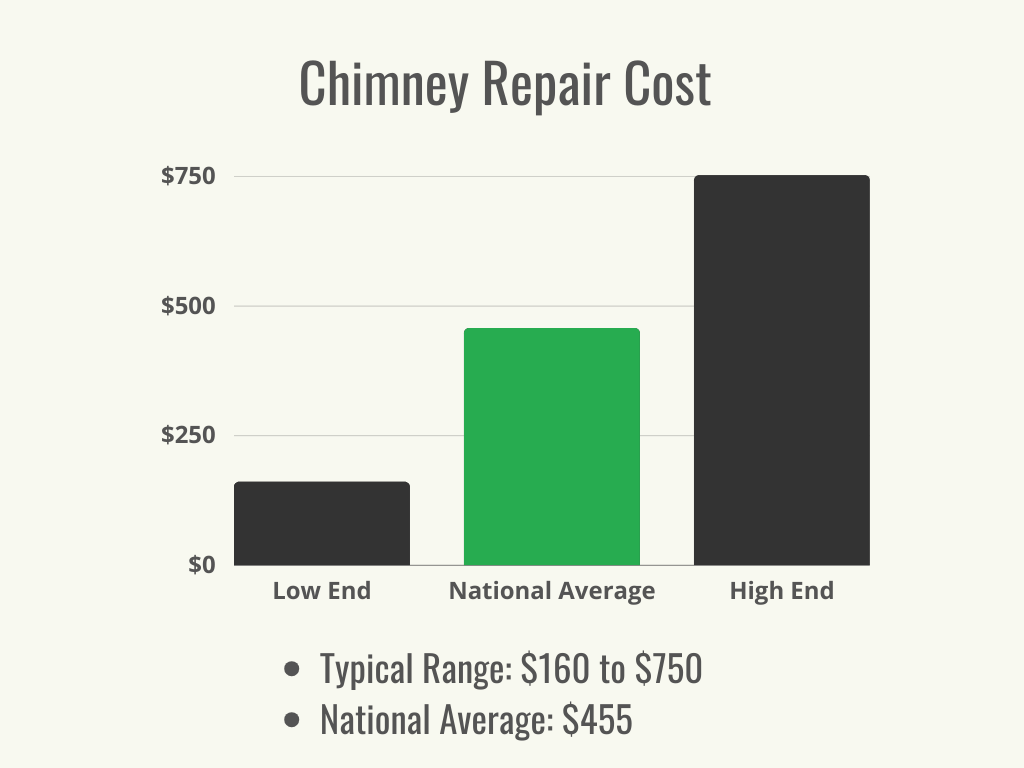We may earn revenue from the products available on this page and participate in affiliate programs. Learn More ›
Highlights
- The typical range for chimney repair costs is $160 to $750, with a national average of $455.
- Cost factors for chimney repairs include repair type, chimney type, repair method, labor, and roof pitch and height.
- Water leaks, cracks, smoke blowback, shaling tiles, spalling bricks, and a leaning chimney are all signs that chimney repairs are needed.
- It’s generally best to leave chimney repairs to trained professionals who can ensure that the chimney is back in safe, working order.
A chimney is a vertical channel, often made of stainless steel, concrete, clay, or brick, that allows smoke and combustion gases from an interior fireplace or furnace to safely escape through the roof of a home. Not all homes have a traditional brick chimney, and not all fireplaces need a chimney, but for those homes with a chimney, repair is sometimes inevitable.
According to HomeAdvisor and Angi, homeowners can expect to pay between $160 and $750 for chimney repair, with the national average chimney repair cost falling in the middle at $455. There are several factors that influence the final price of a chimney repair, including repair type, chimney type, permits, and emergency fees.
This guide will cover the top considerations when homeowners are estimating chimney repair cost, along with common signs that a chimney repair may be required and tips for saving money when hiring a chimney repair company to address the problem.
Factors in Calculating Chimney Repair Cost
Chimney repair cost falls within a typical range of $160 to $750. Factors like repair type, chimney type, repair method, and labor all play a role in the final cost of chimney repair. Here are the top price determinants homeowners will want to keep in mind when estimating chimney repair cost.
Repair Type
While chimneys may seem simple in nature, the truth is that chimneys are complex structures with many different parts, many of which can fail over time. That’s why a chimney that looks normal to a homeowner can actually present several issues when inspected by a professional. Every repair job is unique, and there’s a wide range of chimney repairs that may need to be carried out to get a chimney back in shape. Of course, they all come with different costs based on their complexity.
Repairing the chimney cap has the lowest cost, between $100 and $250. Repairing flashing is also fairly affordable, costing between $200 and $300. Repairing mortar on a masonry chimney is a common job, with a chimney crack repair cost averaging $150 to $500. Repairing the siding of a chimney costs between $500 and $600.
More expensive repair types include work on the smoke chamber, which costs between $500 and $2,000. Repairing a chimney stack is also a potentially expensive endeavor, costing between $500 and $3,500. The foundation is yet another pricey repair, with a cost range of $1,500 to $3,500.
Chimney Type
Chimneys are made from a variety of materials. Chimney material type has a significant influence on the average cost of chimney repair.
For example, metal is a popular chimney material that offers strength and durability and stands up well to the elements. But a metal chimney can be dented or damaged during a storm, and issues with the flue or smoke chamber are common. Repairing a metal chimney costs between $200 and $1,200.
A prefab chimney has an identical price range of $200 to $1,200. The difference is that these types of chimneys are made in a factory and assembled on-site, so they offer fewer customization options than standard metal chimneys. Like metal chimneys, prefab chimneys suffer from issues related to their stainless or galvanized steel components, but they also offer durability and less overall maintenance.
Masonry has a classic aesthetic and is what most homeowners associate with a fireplace. While masonry chimneys offer value and a classic look to homes, they also wear out over time from weathering and erosion. From time to time, masonry chimneys may need remortaring or even rebuilding to keep them in safe working order, especially since they usually burn wood, which can create more carbon dioxide than other sources. Homeowners can expect to pay between $175 and $1,000 for a traditional wood chimney repair.
Stucco is another common chimney material, but it can be costly to repair, with an average stucco chimney repair cost range of $1,000 to $4,000. A stucco chimney offers multiple benefits, such as sustainability and great color retention, which may make the cost worthwhile for homeowners.
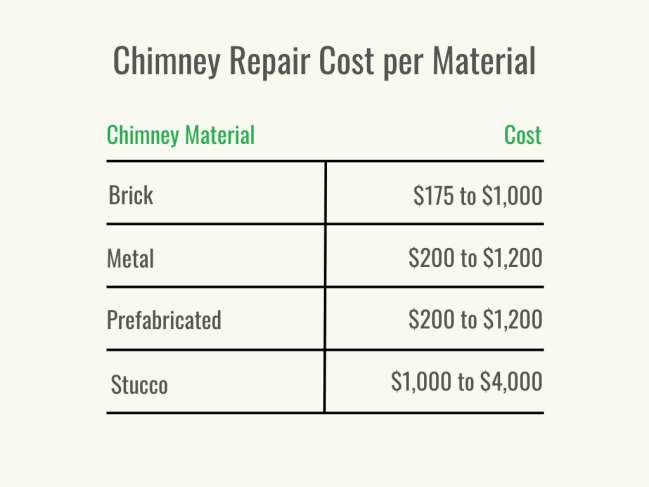
Repair Method
Different chimney issues have different repair methods and solutions. A professional may offer several repair options depending on the state of the chimney.
Remortaring a chimney is a common crack repair method and costs between $150 and $500. Sealing is another repair method, with an identical price range of $150 to $500. Repointing and tuckpointing are repair processes that focus on the chimney’s mortar, either to repair it or to make it match the bricks; they both have a cost range of $500 to $2,500. Parging a chimney (adding a coating of mortar to the smoke chamber to create a smooth surface) costs between $1,000 and $2,000. The most expensive types of repair methods include complete chimney restoration, which costs between $250 and $4,000, and rebuilding, which costs between $500 and $4,000.
| Repair Method | Cost |
| Parging | $1,000 to $2,000 |
| Rebuilding | $500 to $4,000 |
| Remortaring | $150 to $500 |
| Repointing | $500 to $2,500 |
| Restoration | $250 to $4,000 |
| Tuckpointing | $500 to $2,500 |
| Sealing | $150 to $500 |
Labor
Chimney repair is dangerous and will most likely need to be handled by a professional. This can equate to higher labor costs, especially for repair jobs on chimneys that are difficult to access. Professionals also risk being exposed to dangerous chemicals, and labor costs reflect this risk.
The labor costs for chimney repair range from $50 to $150 per hour. Some chimney repairs can be fairly quick, so homeowners can also expect a base fee of $50 to $100. If the repair is more substantial and requires scaffolding, the labor cost can increase an additional $50 to $200.
Roof Pitch and Height
The more difficult a chimney is to access, the higher repair costs may be. Roofs that are particularly steep or too high for a ladder may require special scaffolding, which may raise the project cost. These kinds of projects may also take longer to complete, which will increase the cost of labor as well.
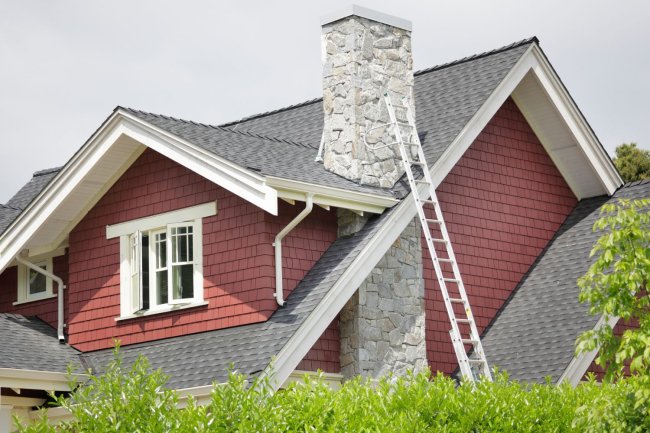
Additional Costs and Considerations
Not every chimney repair cost calculator will include the following costs and considerations; knowing that these scenarios are possible can help a homeowner avoid surprise fees.
Repair vs. Replacement
Choosing between repair and replacement affects the final cost of the project. Homeowners won’t want to rely on budget alone when making this type of decision, though; they’ll want to take safety into consideration, as not all chimney issues can be repaired. Though it’s more expensive, a chimney rebuild might be the best option for the structural integrity of the home and safety of the residents.
While the average chimney repair cost is between $160 and $750, the average chimney rebuild costs $500 to $4,000. That is a significant difference in pricing, but there are scenarios where replacing a chimney can cost less than making repairs in the long run.
The age of the chimney is also a factor to consider. A chimney can last 50 to 100 years or more, but a chimney with its best years behind it will likely need to be replaced. Replacement costs are unlikely to go down over time, so replacing an old chimney sooner rather than later can offer homeowners savings against future potential costs.
Chimney Cleaning
Chimney cleaning is an annual part of a chimney’s routine maintenance schedule and includes a quick survey of the area and preparations such as putting down a drop cloth or plastic sheet to protect indoor furnishings.
According to Russ Dimmitt, director of education for the Chimney Safety Institute of America (CSIA), there are two main chimney cleaning methods: “The first is manually sweeping the flue using rods and brushes. This method is the less common of the two. Most chimney professionals use rotary sweeping tools powered by a drill. The rotary method is preferred, as it provides a more thorough sweeping. Either method necessitates dust control measures. Typically a special vacuum system is used to control dust. Many chimneys can now be swept from below with rotary methods.”
If an issue is spotted during the cleaning process, the best chimney cleaning services will inform the homeowner so they can take the required action. A chimney sweep costs between $80 and $200, with any potential repairs or issues costing more. If a chimney has been neglected for some time, chimney cleaning costs can be as much as $800.
Chimney Inspection
Like chimney cleanings, chimney inspections are recommended once a year. Chimney inspection costs will depend on the level of inspection that is necessary. In most cases, a cleaning and an inspection can be done at the same time; these are basic in nature and labeled as level 1 inspections. When the need for repairs or updates becomes obvious, a level 2 inspection becomes necessary. These are a bit more in-depth and cost between $100 and $500. When there is major structural damage to the chimney, due either to a natural disaster or neglect, a level 3 inspection is required. This meticulous inspection can cost between $1,000 and $5,000.
Emergency Repair Fees
Sometimes chimney repair can be urgent. This is common when a severe storm has sent a tree branch directly into a chimney or when smoke is pouring into a home after a homeowner has lit a fire in the fireplace. Emergency scenarios include chimneys with cracks in the flue that could allow poisonous gases to come into the home and chimneys that are severely leaning and are at risk of crumbling. According to Dimmitt, “If you smell or see smoke or fumes from the chimney inside the home, if you notice charring or drying of wood or other combustibles near your chimney, or you hear sounds from your chimney, these need attention as soon as possible.”
For same-day chimney repairs, professionals will typically charge an emergency repair fee. This is to encourage clients to schedule repairs during normal business hours. An emergency suggests that the inspection and repair can’t wait, so an additional cost reflects the after-hours nature of the service call. Homeowners can expect to pay an additional $100 and $300 for emergency repair fees for chimneys.
Permits
Not all types of home improvement work require a permit, including a basic chimney cleaning and annual inspections. But when a chimney repair requires gaining access through masonry, demolition, removal of components, or extensive masonry repairs, a permit is usually required.
Local municipalities set the rate for permits. Some are very affordable, while others can be quite expensive. Besides location, the type of repair being done can also influence the cost of a permit. For general construction permits, homeowners can expect to pay between $150 and $2,000. A chimney repair is likely to be on the lower end of this price range, but homeowners will want to keep the potential cost of a permit in mind when budgeting for their chimney repair job. It also helps to work with chimney repair companies that build the cost of permits into their pricing and take on the responsibility of filing for and securing any required permits.
Roof Repair
Depending on the type of chimney damage, there may also be damage to the roof that needs to be addressed. For example, it’s not uncommon for there to be water damage on the roof surrounding the chimney if the flashing has been damaged. Similarly, severe storms can damage both the roof and the chimney. On average, roof chimney repairs typically cost between $348 and $1,186.
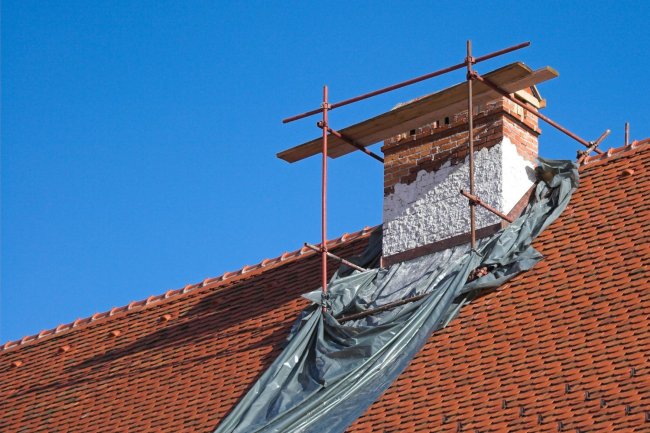
Types of Chimney Repair
Every chimney repair job is unique. Some are fairly simple and don’t rack up excessive labor charges, while others are extensive and can quickly max out a repair budget. Homeowners can use the following price guide broken down by types of chimney repair to help estimate their potential costs.
| Type of Repair | Cost |
| Brick replacement | $100 to $1,000 |
| Cap repair | $300 to $600 |
| Chimney repointing or tuckpointing | $700 to $2,200 |
| Cricket repair | $700 to $1,300 |
| Crown repair | $750 to $1,000 |
| Flashing repair | $200 to $300 |
| Flue repair | $300 to $2,000 |
| Foundation repair | $1,500 to $3,500 |
| Liner replacement | $1,200 to $4,600 |
| Mortar repair | $150 to $500 |
| Siding repair | $500 to $600 |
| Smoke chamber repair | $500 to $2,000 |
| Stack repair | $500 to $3,500 |
| Wood rot repair | $100 to $4,000 |
Brick Replacement
The cost of brick replacement depends on how many bricks are being replaced and how easy they are to access. Replacing a couple of bricks is an affordable job, but multiple bricks in hard-to-reach areas can eat up a repair budget quite quickly. On average, homeowners can expect to pay between $100 and $1,000 for chimney brick replacement.
Cap Repair
A chimney cap sits at the top of a chimney, right above the chimney crown. It helps prevent rain and wildlife from entering the chimney. A chimney can technically function without a chimney cap, but its benefits more than outweigh the cost to purchase one. When the chimney cap begins to rust or crack, a repair is necessary to prevent water from entering the home. Chimney cap repair is often more expensive than replacement. A new chimney cap costs $300 to $600 on average.
Chimney Repointing or Tuckpointing
Repointing is a process that is done to prevent crumbling mortar from causing the chimney to collapse. Professionals will remove the existing damaged mortar and replace it to strengthen the chimney stack. Tuckpointing is a similar process that involves cleaning up the mortar and filling in gaps to make the chimney more visually appealing. Each of these processes has a cost range of $700 to $2,200.
Cricket Repair
A cricket helps divert water around the chimney to prevent leaking. It also stops debris, snow, and ice from building up around the chimney, so it’s a crucial component. It’s possible to repair a chimney cricket, with costs between $700 and $1,300. While a repair can sometimes be an affordable option, replacing the cricket may sometimes be the more money-savvy choice. A new chimney cricket costs between $200 and $1,000 to install.
Crown Repair
Chimney crowns are the slab of concrete at the top of a chimney and are designed to protect the brick and mortar, keep rain from coming down the flue, and keep animals from entering the chimney. A chimney crown also prevents sparks from flying out of the chimney and onto the home’s roof, making it a very important safety feature. Chimney crown repair costs between $750 and $1,000.
Once cracks start to form in a crown, it can quickly begin to break down. Eventually, it will deteriorate past the point of repair and need to be replaced. This can be expensive, with a replacement cost range of $1,000 to $3,000. That’s why it’s always best to handle chimney crown repair as soon as possible.
Flashing Repair
Chimney flashing is a sheet of metal installed around a chimney to create a waterproof seal between it and the roof. While chimney flashing typically has a long lifespan, it does wear out over time. If there are gaps in the caulk around the flashing, rust or water stains on the interior walls or ceiling near the chimney, sounds or signs of dripping water, or discolored bricks on the chimney, it may be time to replace the flashing.
A chimney flashing repair costs between $200 and $300. But for larger chimneys or ones made from stone or brick, a more expensive chimney flashing repair may be required.
Flue Repair
A flue is a conduit, typically constructed from tile, installed inside a chimney. It’s intended to contain the combustion products and then direct them outside. It also protects the chimney walls from heat and corrosion. Cracks within a flue liner are dangerous and require chimney flue repair as soon as possible. Lighting a fireplace is never recommended if the flue is damaged, since there is a risk for a serious fire. A homeowner will never want to ignore signs of a damaged flue, which include the appearance of thin slices of tile in the fireplace, also called shaling. The average chimney flue repair cost is between $300 and $2,000. Repairing a single tile will be at the lower end of this cost range, but major cracks can increase the cost significantly.
Foundation Repair
A chimney’s foundation is the structure’s base. If the foundation breaks or becomes damaged, the chimney can start to lean. This can lead to a multitude of issues, all of which need prompt attention. The price range for fixing a faulty chimney foundation is between $1,500 and $3,500, making it a more expensive (but completely necessary) chimney repair.
Liner Replacement
A chimney liner, which lines the inside of a chimney and directs fumes up and out of the flue, is sometimes legally required for a wood-burning stove or gas fireplace, depending on local building codes. In some cases, a chimney liner may be necessary if the flue inside the chimney is no longer safe to use. This is common in older properties.
Liners that are structurally sound can be resurfaced as long as any existing flue tiles aren’t broken. Relining or replacing a chimney liner costs between $1,200 and $4,600, depending on how large the liner is and whether the old one needs to be removed.
Mortar Repair
Mortar holds bricks together in a chimney or any other brick structure. It’s strong but does wear out over time, mainly due to expansion and contraction from temperature fluctuation. Cracks can begin to form, allowing smoke, carbon monoxide, and even stray embers to get between the walls or onto the roof and create a fire hazard.
Cracks are best treated when they first appear, before they get deeper or longer. Mortar repair can cost as little as $150, but if cracking is ignored and allowed to spread for too long, chimney mortar repair can cost as much as $500.
Siding Repair
Just like a home, chimneys can have siding. Chimney surrounding is usually made of wood but can also be made from other materials such as aluminum. Heavy storms can damage chimney siding, while general wear and tear is expected over the years as well. Chimney siding can be patched or readjusted, but it’s a repair that homeowners won’t want to put off for too long. For the homeowner budgeting for chimney siding repair, costs tend to fall between $500 and $600.
Smoke Chamber Repair
The smoke chamber is positioned above the fireplace. It includes an upside-down funnel shape to help move soot, creosote, and dangerous gases away from a living space and through the chimney flue to the outside. Over time, cracks and holes can develop throughout the chamber. It may also need to be parged, or have a fresh coat of mortar applied, so that it has a smoother surface. The average cost of smoke chamber repairs is $500 to $2,000, depending on the extent of the damage.
Stack Repair
The chimney stack projects above a roof and is what people typically picture when a chimney is mentioned. The stack is exposed to the elements and withstands a lot of wear and tear over the years. Minor damage isn’t terribly expensive to repair, but as damage levels increase, so does the risk and therefore the cost. Damaged stacks can lead to dangerous smoke blowback or be at risk of crumbling and falling. Chimney stack repair can be as affordable as $500 but also as expensive as $3,500. If the homeowner acts quickly when they notice chimney stack damage, such as crumbling mortar or loose bricks, they can help keep repair costs as low as possible.
Wood Rot Repair
Wood rot tends to be a result of a leaking chimney. As water enters through cracks, it begins to soften and damage any surrounding wooden structures. Mold can also be an issue along with wood rot. There are a couple of methods to make chimney leak repairs and ways to stop wood rot from progressing. The average leaking chimney repair cost depends on the solution method.
Chimney sealing involves filling in cracks with mortar, which can cost anywhere from $150 to $500 depending on severity. Flashing can also be installed, which costs between $200 and $300.
The cost of chimney wood rot repair depends on how extensive the damage is. Repairs to confined areas of wood rot cost between $100 and $300. A larger portion of wood rot is likely to cost between $2,500 and $4,000 to repair.
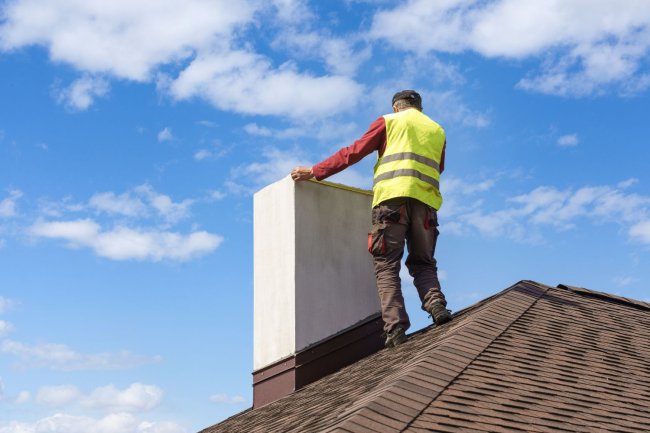
Do I need chimney repair?
A chimney is just like any other part of a home: It requires routine maintenance and will show signs of wear over time. “Some things that indicate repairs are needed are loose bricks or stone, or deteriorating mortar or bricks. If rust or corrosion is seen on a metal chimney or vent, replacement is needed. Water or moisture in the home or chimney should be addressed, as this not only damages the chimney but also the home,” Dimmitt adds. It’s advisable for homeowners to watch for the following signs and symptoms, which suggest chimney repair is needed.
Water Leaks
Water leaks are a common sign of a chimney in need of repair. In fact, leaking water is one of the biggest red flags in chimney performance. Rain entering the house through the chimney can lead to several dangers. To start, moisture can lead to mold, which can cause allergic symptoms like watery eyes and a runny nose. Repeated exposure to mold can increase the intensity of a homeowner’s allergic attack over time.
In addition, moisture and mold can start to weaken a home’s structural integrity. A chimney with a properly functioning cap and flue liner is unlikely to leak. Signs of moisture generally suggest a chimney inspection is needed to diagnose the potential problem, as even heavy rains and seasonal melts should not introduce water to a home through the chimney.
Cracks
Chimney cracks are never normal and need to be inspected by a professional. Cracks can appear in a few different places on a chimney. A crack in the chimney crown happens most often in the winter and spring due to quickly changing temperatures. Since the crown is the chimney’s first line of defense, it tends to take a hard beating from the elements. A cracked chimney crown can lead to water damage and needs to be quickly addressed. When a cracked crown isn’t tended to, the masonry can begin to break down, which creates an open-door policy for bugs and critters.
Cracked mortar joints are also a serious issue. Mortar is what holds the chimney bricks together, and repeated exposure to snow, ice, rain, and temperature changes makes it weaken over time. As mortar joints crack, they’re unable to support the weight of a chimney. This is another type of chimney crack that needs to be repaired as soon as possible.
Smoke Blowback
Smoke that blows down the chimney and into the home is called blowback. This happens when the fireplace isn’t producing a strong enough draft to blow the smoke out, and it can be caused by a few different things.
A blockage in the ventilation system is a common cause of smoke blowback and can be the result of debris, buildup, or a broken flue. A dirty chimney is another potential cause of blowback. An improperly sized smoke chamber can also allow smoke to find its way back into a home.
In a best-case scenario, smoke blowback is caused by a problem that doesn’t require chimney repair, such as poor wood quality. But because there are multiple causes of blowback, some of which can be very serious, it’s best to have a professional examine a chimney producing blowback to see if a repair is needed.
Shaling Tiles
Shaling, or flaking, tiles are a sign of a damaged chimney liner. If there are flakes of chimney tile accumulating in a fireplace, it’s an urgent sign of necessary repair. If left alone, a chimney with shaling tiles can eventually become a house fire hazard.
Additionally, ignoring shaling tiles will lead a chimney’s brick to be exposed to extreme heat. This means that shaling tiles are one of the first signs of a deteriorating chimney, and they can lead to a domino effect of other symptoms, potential hazards, and expensive repairs if ignored.
Spalling Bricks
Spalling bricks are the result of moisture. As water seeps into a brick and then goes through multiple freeze and thaw cycles, the structural integrity of the brick is compromised. This can cause bricks to crumble, flake, or even pop completely out of the chimney.
Spalling bricks can be a purely aesthetic issue, but it’s hard to tell without an inspection. A professional can determine if the issue is cosmetic or if there is a risk of serious structural damage as the bricks continue to deteriorate. When it comes to spalling, it’s best to take care of it right away. Applying a masonry sealant can help keep spalling at bay, but if the damage is already done, the homeowner will want to look into chimney brick repair quickly.
Leaning Chimney
Chimneys tend to have their own foundation or footing. So just because a home’s foundation is solid doesn’t mean a chimney is resting on a solid surface. While a failing home foundation doesn’t mean a chimney is impacted, a leaning chimney is serious and requires a prompt inspection.
Chimneys that are tilting, leaking, allowing smoke to come indoors, crumbling, or exposing gaps between the chimney and the home are all likely leaning. This can be due to poor construction, masonry issues, missing or compromised footing, expanding soil, or poor water drainage.
Although leaning chimneys can be repaired, replaced, or removed, depending on the situation, a leaning chimney won’t get better on its own. When one starts to tilt, homeowners will want to get it inspected sooner than later to prevent costly consequent damage.
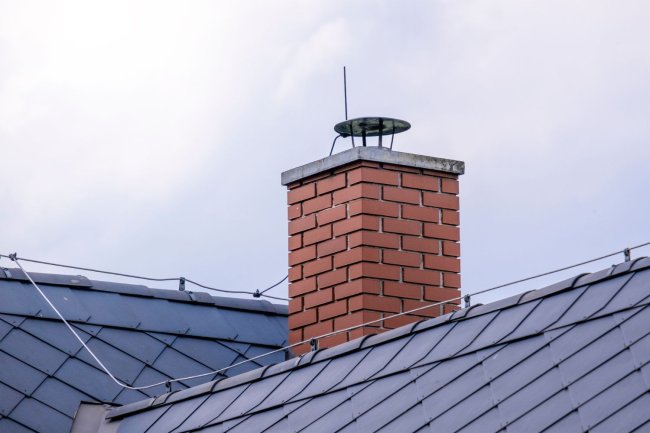
Chimney Repair: DIY vs. Hiring a Professional
Certain DIY projects can help homeowners save money while getting the job done, but chimney cleaning and repair are best left to the pros for three main reasons.
The first is safety. Dimmitt advises, “Most repairs are best left to chimney professionals. Chimney professionals are trained in safety measures that need to be taken when working at height to reduce fall hazards… You should never forget you are putting fire inside your home intentionally, and that requires a high level of vigilance and attention to detail that is best provided by a trained professional.” Additionally, chimneys can be difficult to access, which means ladders and scaffolding are often required. Both options come with a serious fall risk for novice homeowners; chimney repair contractors know how to take the proper safety precautions to repair the chimney without risking injury.
The second reason chimney repairs need to be left to the professionals is their experience. There’s no substitute for the hands-on experience a pro earns through years of chimney repairs. Professionals are also familiar with building codes related to chimney masonry repairs, which is something that could be overlooked by a DIY homeowner. While video tutorials and how-to guides can be helpful, they’re not a substitute for professional work.
Finally, equipment (or lack of) can be a main concern when homeowners are tackling a chimney repair DIY style. Specialty tools and equipment are usually required for chimney repairs, and the list of necessary tools can grow quite long if multiple repairs are needed. While a homeowner can rent or buy these tools, this will likely wipe out any potential DIY savings. In addition, some of the equipment can be dangerous to use without proper training, making borrowing or renting tools a risky move.
DIY fireplace or chimney repair may be tempting, especially if the fix seems simple. But chimneys can have hidden issues that can put a homeowner, their family, and their house in danger of a serious fire. Additionally, a chimney that’s not properly repaired is still at a structural risk; collapse can be a serious side effect of a poorly repaired chimney. For all of these reasons, homeowners are advised to leave chimney repairs to the pros, even if it costs a bit more than what’s ideal for the budget. The peace of mind a homeowner gets when they know their fireplace and chimney are operating efficiently and safely is worth it.
How to Save Money on Chimney Repair Cost
Chimney repairs are sometimes unavoidable, but that doesn’t mean such a job has to break the budget. Safety will need to be a priority, and cutting corners during a chimney repair is never recommended. Here are a few ways homeowners can save on a chimney repair project without sacrificing quality.
- Shop around. Reach out to more than one chimney repair professional. Ask for detailed quotes to make sure the lowest price isn’t missing critical steps of a repair process and to avoid ruling out the most expensive price in case it actually offers the most value.
- Explore all of the options. Solutions can include different repair types, a chimney removal, and a chimney replacement. The overall cost and savings can be surprising. For example, replacing a chimney may cost more initially but save money in the long run if an older chimney is going to require multiple repairs within a few years.
- Look into your homeowners insurance policy. Homeowners insurance may cover chimney repair costs if the problems were caused by a covered event.
- Keep up on maintenance. This will help to extend the life of a chimney and includes having a functioning fireplace damper, making sure the chimney isn’t experiencing moisture issues, and getting the chimney routinely swept.
- Schedule inspections during the offseason. “The best time to schedule a chimney inspection is during the spring or summer months,” says Dimmitt. “As cooler weather approaches, chimney professionals are booked out for extended periods of time, usually weeks and sometimes months.” Booking when business is slow typically means costs will be significantly lower.
Questions to Ask About Chimney Repair
Fixing a chimney requires experience and skill. Knowing how to find the best chimney repair service near you for the job can make all the difference in prices and execution. Homeowners seeking a skilled chimney repair professional will want to consider asking an appropriate combination of the following questions.
- How long have you been in business?
- Are you licensed and insured?
- Do you have any references I can speak with?
- Do you have any serious complaints or lawsuits pending?
- Are you certified by the Chimney Safety Institute of America (CSIA)?
- How are your employees trained, and are they certified?
- What is included in the inspection?
- Do you perform a camera inspection or just a visual inspection?
- Do you recommend a repair, replacement, or removal?
- When can the job start?
- Is it safe to use my fireplace until then?
- How long will the job take?
- Is there anything I need to do or prepare before the job starts?
- How will you make sure debris and other material won’t end up in my yard during the repair?
- How long should I wait to use the fireplace after the repair has been completed?
- What can I do for maintenance to make sure my chimney lasts as long as possible?
- What should I look for in the future that may signal additional work is needed?
- How long do you expect my chimney to last?
FAQs
When a chimney needs to be repaired, homeowners will want to take prompt action to fix the damage before it gets worse. The average chimney repair cost is $455, making it an overall affordable home improvement project that can add value to a home and offer priceless peace of mind for its owner. Consider the following common FAQs when trying to decide if it’s the right time for a chimney repair project.
Q. Does homeowners insurance cover chimney repair?
Homeowners insurance typically covers chimney repair, provided the damage was caused by a covered peril. Every policy is different, but covered perils typically include lightning strikes, fire damage, wind damage, and falling objects, such as tree branches. If the chimney damage is due to normal wear and tear or neglect, any repair costs are typically not covered by homeowners insurance. Homeowners are advised to read their insurance policy documents carefully to make sure they fully understand what is and is not covered.
Q. When should I replace my chimney?
The answer to this question depends on the material or part of the chimney in question, but the good news is that a properly installed chimney will have a long lifespan. There are a few guidelines to help homeowners know when it’s time to replace their chimneys. Clay tile liners will need to be replaced every 50 years, while stainless steel liners last an average of 15 to 20 years. Mortar will need to be replaced every 25 to 30 years, and chimney crowns last between 50 and 75 years.
Q. Should I remove or repair my chimney?
A minor issue with a chimney can typically be addressed by a repair. But if the damage is extensive, removing a chimney could be the better option. Typically chimney removal costs more than repair, but it’s important that safety be a top consideration in this decision.
Q. What is the difference between repointing and tuckpointing?
Both repointing and tuckpointing are repair processes. With repointing, professionals focus on restoring a chimney stack’s mortar and brickwork. Tuckpointing may be used for aesthetic reasons and focuses solely on the mortar. It’s usually done to make the mortar match the surrounding bricks.
Q. How often should I have my chimney cleaned?
A chimney needs to be cleaned and inspected at least once a year by a qualified professional. For an oil- or wood-burning fireplace, cleanings need to be bumped up to twice a year or more if the fireplace is used on a regular basis. Homeowners will also need to keep up with their own maintenance routines, such as keeping the firebox clean and investing in a chimney cap or crown.
Sources: Angi, HomeAdvisor, Fixr, HomeGuide, LawnStarter
